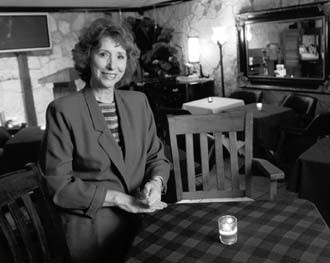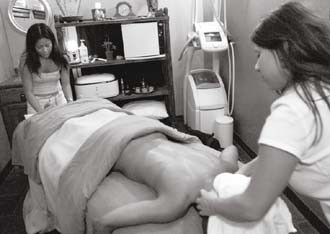|
By Laurie Dietrich "Fifteen years ago I killed my sister." It's a great lead, but it's not mine. It's the first sentence of Adam Rapp's play Nocturne, now showing at the newest theater space in (or in this case just slightly outside of) San Antonio. The venue is almost as interesting as the production, and, having borrowed the show's attention-grabbing opener, I'll borrow its maddening structure, too, and meander my way, through thickets of thick description, back to whence I began. On Valentine's Day 2004, the Blue Hills Inn and Spa opened its doors in a cozy wooded enclave just outside Loop 1604. Driving onto the property, through the large limestone arch of the gate, a sense of away-from-it-all settles in. That sense is unsettled, a bit, when you open the car door and hear the highway noise. Interstate 10 is a little too close a neighbor for comfort. Owner Evelyn Wilkins has been a guest at, and admirer of, fine spas and hotels around the world. She's attempted to re-create some of those experiences on an intimate scale with a little bit of friendly Texas twang and unpretentious, low-key luxury. A free-standing, smallish stone "house" wears a welcoming sign identifying it as "The Lobby" - the point of entry to the complex. This is the site of the bar, small kitchen, lounge/dining area (with stone fireplace for ambiance), and the very small stage that will feature prominently later in this article. The spa facilities are housed in a larger stone edifice next door, branching off a small central entry presided over by an indoor fountain. Walk through the doors and sensory relaxation begins with the soothing sound of flowing water and the faintly lavender-scented ghosts of massages past wafting out of the dimly-lit corridors. The massage rooms themselves are chocolate brown, cocoon-like, lit by flickering candlespots of color. Farther down the hall is the whirlpool soaking bath for two. The bathrooms are large and beautifully appointed. The overall ambiance is one of discreet decadence, self-indulgence in impeccable taste.
On Saturday nights, Blue Hills' latest venture, The Side Door Theatre, offers dinner theater to those willing to make the drive. Del Routsong, Side Door's artistic director, inaugurated the new space with A.R. Gurney's readers' theater piece Love Letters, a good choice for a small space and an audience that doesn't want to be put off their food. The third production is shaping up to be a Gershwin revue, also a good choice for the clubby feel of the space. Rapp's Nocturne, which just finished its run, however, is an odder, perhaps braver selection. We'll get back to that in a minute. On Saturday nights guests can arrive at 4 p.m. and enjoy cocktails and live music on The Gazebo, a multi-leveled, partially covered outdoor patio sprinkled with tables, loungers, and massage chairs. The centerpiece is a pond-like hot tub with a waterfall. The music rises over the sound of the water, pausing occasionally for a smattering of applause from the scattering of guests relaxing in the late afternoon sun. The four-course dinner (soup, salad, entrée, dessert) is served between 5:30 and 7:30 p.m. in The Lobby, which holds about 30 people. The show begins around 7:30 p.m., with dessert generally served at intermission or, in this case, as quietly as possible during the second part of the no-intermission, one-man show. Nocturne's sole actor, Brad Milne, moves back and forth through his soon-to-be audience as they dine, setting his props. There is no backstage entrance onto what is essentially a tiny bandstand in the front corner of the room. For this play, the stage is completely filled by a piano, a music stand, a stool, and a small table on which Milne piles hardback novels in a very particular order. This is a hard thing to do - breaking the fourth wall, as theater professionals call the imaginary barrier between audience and performer, before you've even had time to construct it - but harder things are yet to come. On this economic stage, without theatrical lighting, without aesthetic distance, but with the occasional clinking and conversation from the kitchen, Milne is about to embark on a 90-minute monologue that is densely written, technically challenging, and requires the actor to play intense emotion under immense control, to enact the desire to confess and to distance himself from confessor and confession at the same time. He begins: "Fifteen years ago I killed my sister."
The playwright is young, and story's revelation is a young person's revelation: the mundane minutia that attends tragedy, the odd, banal clarity of grief. The language - two mentions of voided bowels, the over-use of the word "molecular" as an adjective - is the sort that some people call muscular and gritty, and others consider precious and pretentious. Although written for the stage, the rhythms are so perfectly that of prose that they lull, disengage, and beg to be read rather than listened to. Milne's ability nonetheless to engage the listener in what is billed as a "rehearsed dramatic reading" bespeaks an expertly scored script and a real talent for oral interpretation and energy management. In his hands, the piece actually gains momentum, depth, and color as it goes on, an arc the structure and text do not themselves provide. With little space in which to exercise a physical characterization, he still manages to impart a slightly manic, zing-y insomniac vibe - like biting on tinfoil - to the role, leaving the impression of an accomplished, mature actor mostly overcoming rather immature material. After the show, Inn guests may retire to one of the three romantic get-away cottages scattered amongst the trees, each complete with "special evening" amenities like wood-burning fireplaces and Jacuzzi tubs. Fair warning though - while Nocturne is likely to give rise to any number of moods, romantic is probably not one of them. •
|



